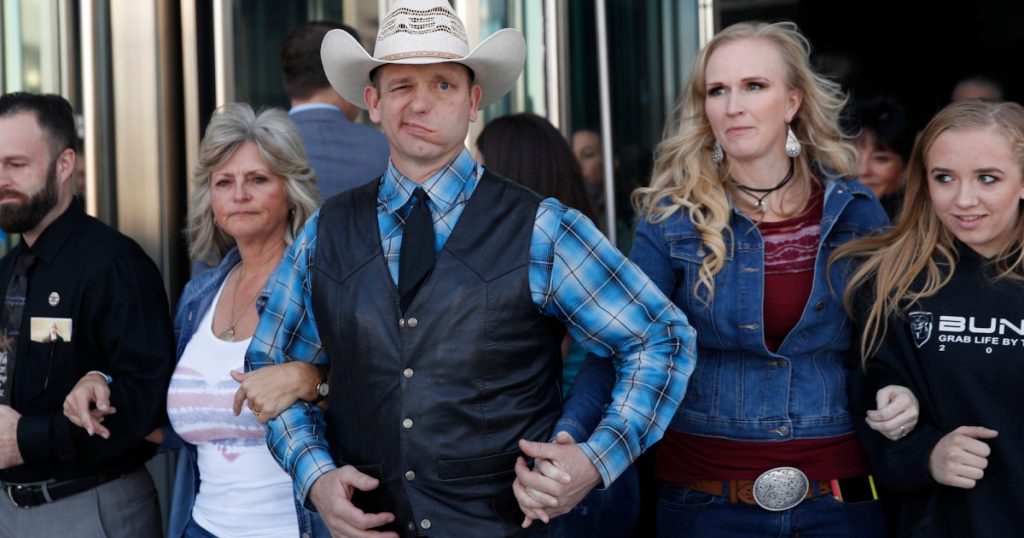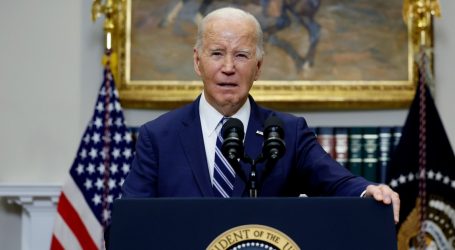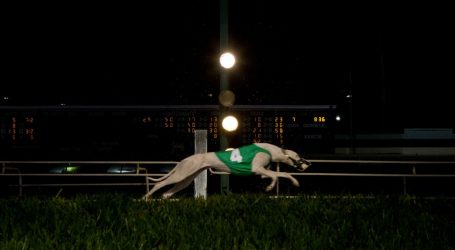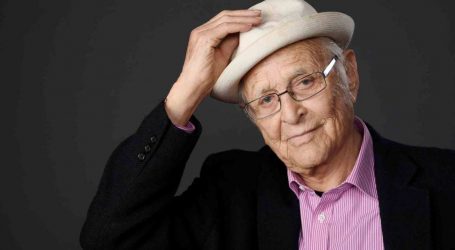Will Ryan Bundy Help Elect a Democrat as Nevada Governor?
Nevada gubernatorial candidate Ryan Bundy, in front of the Las Vegas federal courthouse in December 2017. John Locher/AP Photo
Looking for news you can trust?Subscribe to our free newsletters.
Since declaring his candidacy for Nevada governor in March, Ryan Bundy hasn’t mustered much of a campaign. He has raised only about $37,000 in cash, most of it from out of state, and $24,000 in-kind donations. Not even his famous father, anti-government rancher Cliven Bundy, has donated to his campaign. Bundy’s campaign has spent less than $15,000 on ads, though it did spring for about $325 worth of western wear at a Las Vegas Boot Barn. His social media presence is minuscule but it does include his campaign manager’s Facebook videos of himself, stoned, talking up Bundy’s campaign.
Despite the lackluster campaign effort, Bundy has name recognition and something of a cult following, particularly among rural residents in a state where the federal government owns more than 85 percent of the land. He stands no chance of winning, but Bundy could be this year’s biggest election spoiler in one of the nation’s closest gubernatorial races.
Nevada hasn’t elected a Democratic governor since 1994, but this year, Steve Sisolak, the chairman of the Clark County Commission, has been closing in on Republican Adam Laxalt, the state’s attorney general. At least $27 million of outside money has poured into the hotly contested race. Laxalt has maintained a slight edge, but recent polls have shown the election to be a statistical dead heat. On Friday, the polling site FiveThirtyEight declared it a toss up. Bundy could be a wildcard. Most of the polls haven’t even included him, but one in September, sponsored by the Reno Gazette-Journal, showed that Bundy was drawing about 4.2 percent of the vote—enough to potentially swing the outcome.
“The votes that Ryan would take are probably going to come from rural Nevada rather than urban [counties around Las Vegas and Reno],” says Chuck Muth, a Las Vegas political consultant and former executive director of the Nevada Republican Party. “And that’s where Republicans need to have a good showing.”
Aside from his lack of experience and somewhat extreme political views—he wants to abolish compulsory education, for instance—Bundy is an improbable political candidate. His face is disfigured and his speech somewhat impaired by injuries from a childhood accident. When he was seven-years-old, Bundy was riding in the trunk of his dad’s Ford LTD town car while picking melons when he fell out and his father accidentally backed over his head. The disability leads people to underestimate him. “It bothers me that some people look at his facial disfiguration and infer that he’s somehow dimwitted,” Oregon State University professor Peter Walker, who wrote a book about the 2016 wildlife refuge occupation, told the Nevada Independent recently. “Nothing could be further from the truth.”
Bundy may be a smart guy, but that hasn’t spared his barebones campaign from some dysfunction. In late September, he made news when Nevada reporters noticed that his campaign website advocated a prison reform plan that would require murders to be murdered and convicted rapists to be “raped 3 times as forced by the Nevada Government and orchestrated by the victims (if they are still alive).” All of these biblical punishments would be live-streamed to the public. Bundy quickly disowned the plan and blamed the website language on his pot-smoking, crypto-currency promoting campaign manager, Cardiff Gerhardt, whom he said had posted it without Bundy’s approval.
Nevada Republicans, though, have seen Bundy as a serious enough threat that state party leaders tried to convince him to drop out of the race earlier this year, including Elko County Commissioner Demar Dahl, a friend of Cliven Bundy’s who was involved in the original “sagebrush rebellion” movement in the 1970s. Dahl didn’t respond to a request for comment, but he told the Nevada Independent in September, “I spent an hour at least with him and then an hour with him and his dad trying to convince him that this was not a good thing for him to do. But he was determined and he is still doing it. My concern is that it may give us a Democrat governor, which I think especially for us people in Northern Nevada, is a terrible situation.”
Bundy, who is running as an independent, told Mother Jones he was not persuaded that his campaign would put a Democrat in office. “If they’re too concerned about splitting the vote then maybe Adam Laxalt ought to drop out and allow me to win,” he says. “The principles which I stand for are for liberty for all and will transcend party lines. I’m hoping to draw out a lot of the voters who are not voting. Voter turnout in Nevada is very low. You have to wonder if it’s apathy or are they tired of voting for the lesser of two evils?”
He acknowledges his modest fundraising puts him at a disadvantage, but he questions why his opponents need to raise so much money. “The position only pays $149,000 per year,” he notes. (Laxalt and Sisolak have raised more than $13 million combined.) “That makes it awfully questionable as to why they are spending so much to obtain the position.” He says he has other advantages. “People know who I am,” he says, noting that a local radio host has said Bundy has more name recognition in the state than both his competitors combined.
David Damore, chair of the University of Nevada Las Vegas political science department, says Laxalt has been trying to neutralize Bundy’s influence by playing on rural voters’ fear of a Democratic governor. For instance, he says, Laxalt’s biggest booster comes from urban Las Vegas—billionaire casino magnate Sheldon Adelson—but that last month “his campaign tweeted bits of a letter to the editor in the Elko paper claiming that if Sisolak is elected, northern and rural interests, which have long dominated state politics, will be ignored.”
“If they’re too concerned about splitting the vote then maybe Adam Laxalt ought to drop out and allow me to win,” Bundy says.Laxalt’s own views on public land use aren’t so different from Bundy’s, a sign of just how far the GOP has come in adopting the Bundy view of the West since Cliven’s well-publicized standoff with the Bureau of Land Management in 2014 over grazing rights near his melon farm in Mesquite, Nevada. Cliven had been—and still is—illegally grazing cattle on public land for more than 20 years, damaging fragile ecosystems in the Gold Butte National Monument and threatening the endangered desert tortoise.
By 2014, Cliven owed the feds more than $1 million in unpaid grazing fees and fines, which the Bureau of Land Management attempted to collect by impounding some of his cattle. The Bundys responded by calling on militia groups across the country to help defend their property rights. Photos of snipers with assault weapons aimed at federal law enforcement officers made national news, and ultimately, the federal officers pulled out to prevent a massacre. Prosecutors alleged that, among other things, Ryan Bundy, “along with his brothers led the assault at the impoundment site, delivered the Bundy family’s demands that BLM leave immediately, and announced to the Bundy followers that ‘the west has now been won!’ as the BLM prepared to leave.”
Two years later, Ryan and his brother Ammon led an armed takeover of the Malheur National Wildlife Refuge in Oregon to protest the imprisonment of a pair of ranchers convicted of setting fires on public land. The Bundys were eventually arrested in Oregon—including Cliven, who was picked up at the Portland airport—but not before the FBI shot and killed one of the occupiers. Ryan Bundy was injured in the shooting as well.
An Oregon jury acquitted the Bundy brothers of most of the charges related to the refuge takeover. (The jury hung on a couple of others and they were dismissed.) Then they were tried in Nevada, along with Cliven, on charges related to the 2014 BLM standoff. Ryan represented himself and forced prosecutors to admit they had illegally withheld evidence that might have helped the defense. The judge declared a mistrial, turning the Bundys into folk heroes of the sagebrush-rebellion. Ryan Bundy, who had been in jail for nearly two years because the government argued he was too dangerous to await trial in the community, was released last November. His father finally left jail in January, after all of the charges against him were officially thrown out.
Laxalt initially supported Cliven Bundy in his fight with the feds, as did many other Republicans—until the patriarch of the Bundy clan was captured on video making racist comments to a New York Times reporter. “The men and women involved [in Bunkerville] are ranchers, friends and fellow church-going residents of our state,” Laxalt said in a press release during the 2014 standoff. “These individuals appear to be peacefully asserting the fundamental truth that there are, in fact, Constitutional limits to the power of our federal government.” Six months later, he was denying ever having supported Bundy. “I have never even mentioned once that I support Cliven Bundy,” Laxalt insisted during a debate. “I’ve certainly never said that he’s my friend.”
Even so, Laxalt has been supportive of much of the Bundys’ agenda. In a March appearance, he said that the BLM is “an enemy in our state.” As attorney general, he joined in a federal lawsuit in 2015 over plans to protect the endangered sage grouse. His campaign website echoes calls from the Bundys to return control of federal land to the state. “I’ll also work with the federal government to ease restrictions on land use and access, and to push for the transfer of ownership of more of the lands within our borders,” he writes.
Both Laxalt and Bundy have been touting their anti-federal government bona fides to win votes in rural Nye County, where a water fight involving a Christian church camp in the Ash Meadows Wildlife Refuge called Patch of Heaven has become a local cause célèbre. In 2010, the Fish and Wildlife Service diverted water from a small stream on the property where the church once performed baptisms in an effort to save a number of endangered species.
In April, in one of his earliest campaign events, Bundy held a water rights summit at Patch of Heaven. The church camp owners now count themselves among Bundy’s supporters, even though Laxalt had filed an amicus brief at the Supreme Court in 2015 supporting the church in its lawsuit against FWS. The church lost, and Laxalt moved on. Bundy has not, and if he’s able to win supporters in Nye, he may indeed help Sisolak pull off an upset.
Still, Chuck Muth is skeptical. “He’s got name recognition, and certainly has sympathy for what he went through,” he says. “However, when people go to the polls, they may have a sentimental attachment to a candidate, but when they look at the hard reality, a lot of those rural voters, in the privacy of the voting booth, they’re not going to vote for him.”





